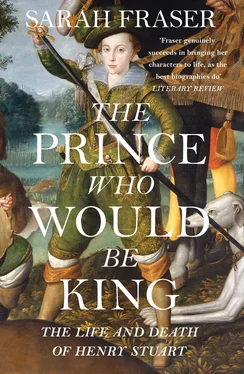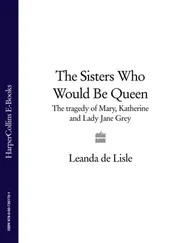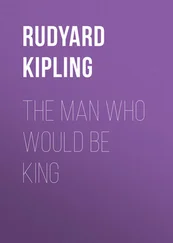Sarah Fraser - The Prince Who Would Be King - The Life and Death of Henry Stuart
Здесь есть возможность читать онлайн «Sarah Fraser - The Prince Who Would Be King - The Life and Death of Henry Stuart» — ознакомительный отрывок электронной книги совершенно бесплатно, а после прочтения отрывка купить полную версию. В некоторых случаях можно слушать аудио, скачать через торрент в формате fb2 и присутствует краткое содержание. Жанр: unrecognised, на английском языке. Описание произведения, (предисловие) а так же отзывы посетителей доступны на портале библиотеки ЛибКат.
- Название:The Prince Who Would Be King: The Life and Death of Henry Stuart
- Автор:
- Жанр:
- Год:неизвестен
- ISBN:нет данных
- Рейтинг книги:3 / 5. Голосов: 1
-
Избранное:Добавить в избранное
- Отзывы:
-
Ваша оценка:
- 60
- 1
- 2
- 3
- 4
- 5
The Prince Who Would Be King: The Life and Death of Henry Stuart: краткое содержание, описание и аннотация
Предлагаем к чтению аннотацию, описание, краткое содержание или предисловие (зависит от того, что написал сам автор книги «The Prince Who Would Be King: The Life and Death of Henry Stuart»). Если вы не нашли необходимую информацию о книге — напишите в комментариях, мы постараемся отыскать её.
NOW THE SUBJECT OF BBC2 DOCUMENTARY The Best King We Never Had
The Prince Who Would Be King: The Life and Death of Henry Stuart — читать онлайн ознакомительный отрывок
Ниже представлен текст книги, разбитый по страницам. Система сохранения места последней прочитанной страницы, позволяет с удобством читать онлайн бесплатно книгу «The Prince Who Would Be King: The Life and Death of Henry Stuart», без необходимости каждый раз заново искать на чём Вы остановились. Поставьте закладку, и сможете в любой момент перейти на страницу, на которой закончили чтение.
Интервал:
Закладка:
Italian delegate and British royals charmed each other. King James’s tutor, Buchanan, had extolled the Venetian constitution, recommending it as a model to his followers. Buchanan’s student, Melville, would have passed the approval to his student, Adam Newton, who passed it to Prince Henry. Yet, Venice was a republic, and Henry the son and heir of a man proclaiming vocally and in print, the divine right of kings and absolute monarchy.
The plague outbreak was the worst for a generation. Travellers carried it from London out into the countryside. The Lord Chamberlain and the Lord High Steward moved the royal couple on, and on – with the Privy Council and the law courts still following behind.
Soon Oatlands fell victim to anxiety over the plague, forcing Henry and his train to follow his father’s court. Elizabeth was moved to new guardians, the Haringtons, parents of Lucy, Countess of Bedford, at Coombe Abbey in Northamptonshire. ‘I most kindly salute you,’ Elizabeth wrote to Henry when she was settled, ‘desiring to hear of your health, from whom, though I am now removed far away, none shall ever be nearer in affection than, your most loving sister, Elizabeth.’ Henry replied with a gift, a verbal message, but also ‘these few lines … I beseech you to accept, as witnesses of my tender dutiful affection … and that by our absence shall [not] be diminished but rather with our years shall be increased … I rest, your loving brother, Henrie’. The formal register of all royal communication masked, but could not prevent, a sense of the deep mutual affection coming through the rhetoric.
Elizabeth thanked him by return. I shall keep these ‘delightful memorials of your brotherly love in which assuredly (whatsoever else may fail) I will endeavour to equal you, esteeming that time happiest when I enjoyed your company … As nature has made us nearest in our love together, so accident might not separate us from living together.’ She always hoped they would live together again.
By December 1603 the number of plague cases each week was falling. On the 23rd, Robert Cecil wrote from Hampton Court, ‘where now the King, with the Queen and the Prince are safely arrived, thank God’.
James had confirmed Cecil in his position as Secretary of State, and raised him to the peerage as Baron Essendon. The king sought to balance Cecil’s power by bringing in two Howards, the earls of Northampton and Suffolk respectively. James was soon calling the three men his ‘trinity of knaves’. The two Howards benefited by the serendipity of being that object beloved by James, ‘an ancient pearl’ of the nobility, as well as having been consistently pro-Stuart before 1603. Northampton was renowned as a man of ‘subtle and fine wit, of good proportion, excellent in outward courtship, famous for secret insinuation and fortuning flatteries, and by reason of these qualities, became a fit man for the condition of these times’. He shared James’s eye for good-looking young men, and was a pedant and flatterer. A Catholic, his support for the Stuarts originated with James’s mother, Mary, Queen of Scots’ claim to the throne. Northampton reverenced the monarchy as divinely appointed, though how he managed to assume high office without swearing the Oath of Allegiance to James and abjuring the pope, was another matter. He must have fudged it somehow. The man wore many masks, and probably played with conviction the role of each one he donned. After years of disappointment, his moment now came with the accession of the Stuarts. Both courtier and councillor, Northampton pursued his own fortune, and government reform. Men like Northampton typified the kind of expert opinion a new ruler could use.
The court settled to enjoy their first British Christmas. Henry threw himself into it. At one moment during the dancing of ‘galliards and corantos … the young prince was tossed from hand to hand like a tennis ball’. The first dynastic marriage of the new era was celebrated – between Philip Herbert, brother of the Earl of Pembroke, and Lady Susan Vere, daughter of the Earl of Oxford. Henry and his Danish uncle, the Duke of Holstein, ‘led the bride to church … The marriage dinner was kept in the Great Chamber, where the Prince, the Duke of Holstein and the great Lords and Ladies accompanied the bride.’ Henry sat next to her at the wedding feast, chatting amiably.
In addition, ‘we are to feast seven Ambassadors: Spain, France, Poland, Florence, and Savoy, besides masques, and much more’, Cecil told a friend, already exhausted by the stamina required to socialise and network at night, and work by day. The names were geopolitical. Some had been in England for months, waiting for the king to return and settle. Cecil longed for Christmas to end so he could get on with the business of government: ‘I protest I am not thoroughly reconciled, nor will not be till we meet at Parliament.’ Whoever was absent on that day, Cecil said, ‘I will protest they do it purposely because they would say, “No” to the Union.’
The plague had delayed the real work of beginning to understand the new sovereign. Having united the crowns, the king now sought the full union of England and Scotland.
The court had its first chance to see who King James really was when he summoned the moderate Calvinists of the English Church, the Puritan Calvinists, and the Roman Catholics to a conference at Hampton Court on 14 January 1604. There they would thrash out the shape of the Jacobean Church.
The Catholics arrived feeling sure the king would lift the penalties against the public profession and practice of their faith. As far as they understood it, James, through the late Earl of Essex, had agreed to remove anti-Catholic legislation, in exchange for Catholic support for James’s candidacy for the throne.
The Puritans arrived feeling even more confident. They anticipated the Calvinist king of a properly reformed Presbyterian Scotland would purify the Elizabethan Church of its papist residues. For them, salvation came only through predestination: God’s will. It could not be earned by attending church ceremonies and rituals of piety, or doing good deeds, as the idolatrous papists and moderates sitting opposite them believed. You got to heaven through faith alone, and constantly proving your faith in God’s goodness by your pious way of life. They knew the Church of England had stalled part way along the path to the international Protestantism of Calvin. God’s appointment of James of Scotland to the English throne was a sign that He knew it as well. James came to perfect the Reformation.
Henry entered the royal presence chamber and sat by his father, the lords of the Privy Council looking on. The king told the conference he did not come ‘to make innovations’ in religion ‘but to conform’. There was ‘one religion’ as ‘by the law maintained’, said James. This law required conformity to the Book of Common Prayer. Elizabeth’s was a national church, generally Calvinist in doctrine but closer to Catholicism in church structure and the rules governing ceremony and forms of worship. The moderates were pleased. Henry knew his father was being consistent with the advice of Basilikon Doron , that the monarch should rule an inclusive church from the middle ground.
The godly Puritans heard, with horror, the king inform them that the English Church only needed upgrading, not further reformation. Investment in education and proper salaries for preachers would produce an intelligent, high-quality clergy. James insisted on retaining ceremonial conformity in the church. He wanted to hear no more extempore preaching odysseys from Puritan clergymen, less open-ended examinations of the Bible with speculative exegesis on its meanings – and no interfering in politics from the pulpit. No theorising would be tolerated about a contract theory of monarchy, or the rightful resistance to a failing monarch; or the explorations of the idea of separate realms and jurisdictions of church and state that had bedevilled his relations with the Scottish kirk.
Читать дальшеИнтервал:
Закладка:
Похожие книги на «The Prince Who Would Be King: The Life and Death of Henry Stuart»
Представляем Вашему вниманию похожие книги на «The Prince Who Would Be King: The Life and Death of Henry Stuart» списком для выбора. Мы отобрали схожую по названию и смыслу литературу в надежде предоставить читателям больше вариантов отыскать новые, интересные, ещё непрочитанные произведения.
Обсуждение, отзывы о книге «The Prince Who Would Be King: The Life and Death of Henry Stuart» и просто собственные мнения читателей. Оставьте ваши комментарии, напишите, что Вы думаете о произведении, его смысле или главных героях. Укажите что конкретно понравилось, а что нет, и почему Вы так считаете.












